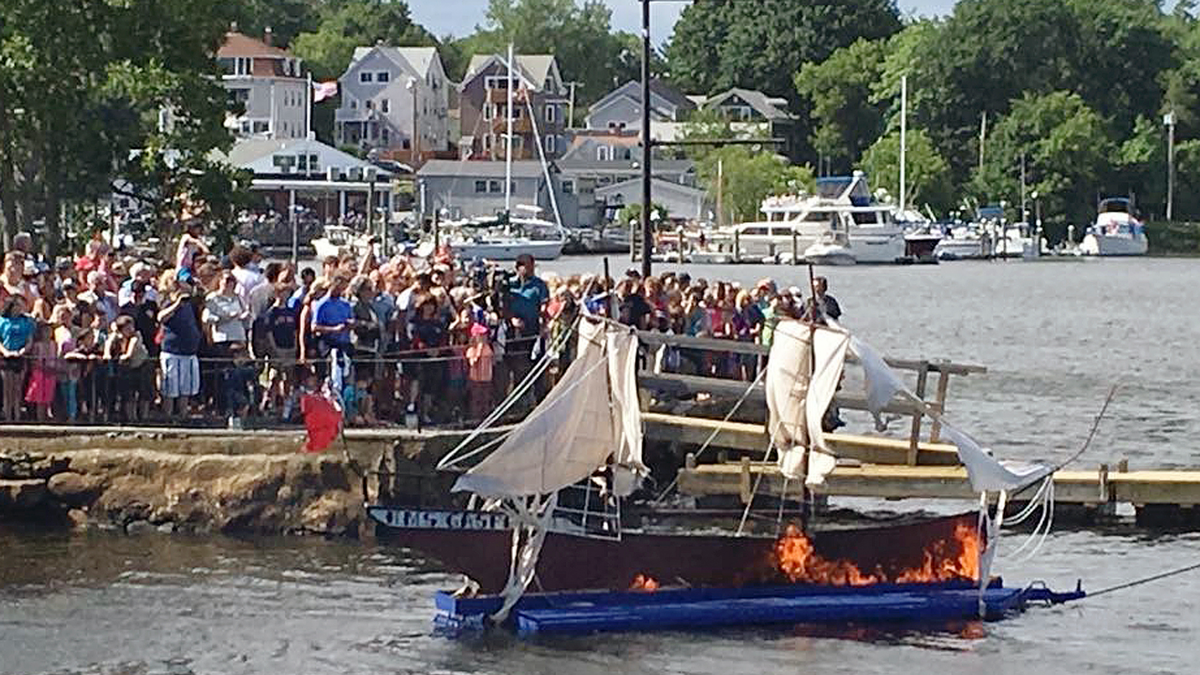
PROVIDENCE, R.I. – Rhode Islanders feel slighted that Bostonians get all the glory for helping spark the American Revolution with the Boston Tea Party. After all, more than a year before any tea was tossed, Rhode Island colonists burned a British ship.
Saturday is the 246th anniversary of the day a local ship captain lured the British schooner HMS Gaspee into shallow waters a few miles south of Providence, where it ran aground. A smaller model of a ship will be burned Sunday to commemorate the forgotten act of rebellion.
U.S. Sen. Sheldon Whitehouse often recounts the story of how colonists waited till night fell, rowed out to the stranded Gaspee, shot the ship's captain and burned the boat. It's a cool story about an extraordinary act, said the Rhode Island Democrat. By comparison, he said, Massachusetts patriots mustered the courage to push tea off the deck of a British boat more than a year later.
"It's going to be a long, slow process to try to correct 240 years of the Massachusetts megaphone, but I think it is important to stick up for historic deeds that were done by Rhode Islanders," said Whitehouse, who spoke about the Gaspee Affair Monday on the Senate floor.
Many Rhode Island residents feel similarly aggrieved.
Historians say the affair reignited patriotic fervor at a time when it had cooled off, and emboldened Bostonians. The chief historian at the recently opened Museum of the American Revolution in Philadelphia believes Rhode Islanders have a legitimate point about its importance being overlooked.
"There's a period where there's hope that maybe things could simmer down, but right in the middle of it, this Gaspee Affair happens," Philip Mead said. "It's really a foreshadowing of what will happen with the Boston Tea Party, because both sides react very strongly to each other."
Seth Rockman, who teaches at Brown University in Providence about the Revolution, thinks people should know more about the Gaspee Affair. But the fact of the matter is, he said, it's not as important as the Boston Tea Party, which set so many more events in motion after it happened in December 1773.
"On the one hand, yes, a full accounting of the coming of the American Revolution should probably draw attention to the Gaspee as a significant moment," he said. "On the other hand, should people in Rhode Island be worked up about it?"
The Gaspee was sent to Narragansett Bay in 1772 to enforce trade laws. The colonists were soon fed up with the Gaspee and its captain, Lt. William Dudingston, stopping ships and disrupting trade, especially after rum was seized from local merchant Jacob Greene, said Steven Park, who wrote a book about the affair.
The Gaspee ran aground on June 9, 1772. Colonists in Providence heard the news and rowed out to it. Later, no one would tell King George III who set fire to the ship. The Sons of Liberty in Boston politicized the event to resist the British government, Park added.
Many historical texts were written in Boston immediately after the war and focused on Massachusetts. The now-famous revolutionary figures schoolchildren learn about weren't involved in burning the Gaspee.
"Even though we might not go so far as to say the Gaspee needs to replace the Tea Party in American consciousness, I think we can agree that those advocating for more attention for the Gaspee are right," Mead said.
The nonprofit Gaspee Days Committee marks the anniversary annually with the model-ship burning and other events in Warwick. The crew of the Gaspee was brought ashore in Pawtuxet Village in Warwick as their ship burned.
"I would hope there never comes a day this legacy is not carried on," said Ryan Giviens, committee president. "Were it written in the textbooks, it would be easier. So as long as it's not, we're going to keep spreading the message ourselves."

